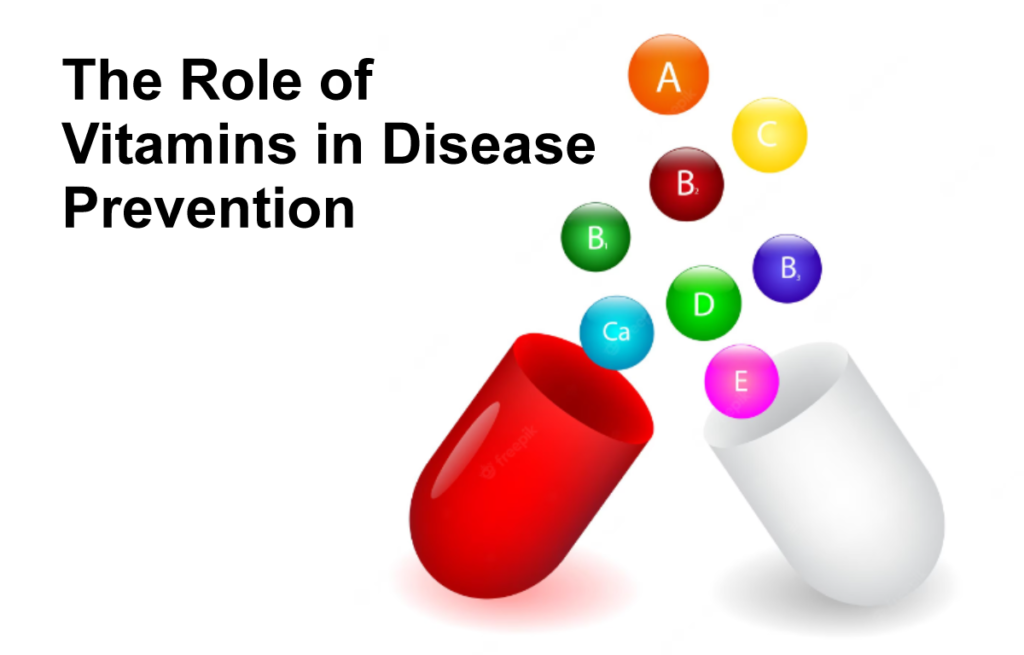The Role of Vitamins in Disease Prevention
The correlation between nutrition and health has been a topic of enduring fascination among researchers and healthcare professionals. Recent discoveries have shed light on a captivating connection between vitamin deficiencies and specific ailments. In this article, we delve into how the absence of essential vitamins, such as vitamin B and C, can be associated with various diseases and underscore the significance of considering vitamin deficiencies as potential contributors to illness.
Vitamin B: A Fortress Against Diverse Maladies
Vitamin B, a complex of eight distinct vitamins, assumes a pivotal role in sustaining a healthy body. Recent investigations have unearthed an unexpected interrelation between vitamin B deficiency and an array of maladies:
Measles and Rubella: Vitamin B6, also known as pyridoxine, is indispensable for fortifying the immune system. An insufficiency of vitamin B6 can heighten vulnerability to infections, including measles and rubella.
Chickenpox and Polio: Vitamin B3, or niacin, is critical for skin health and overall immune functionality. A dearth of niacin can elevate the risk of viral infections, such as chickenpox and polio.
Rotavirus: Rotavirus infections can manifest more severely in individuals deficient in vitamin B12. Vitamin B12 plays a crucial role in fostering healthy gut function and bolstering the immune response.
Pneumonia: A robust immune system is instrumental in warding off pneumonia. Vitamin B2, or riboflavin, is integral to immune well-being, and its deficiency can leave the body susceptible to this respiratory infection.
Tetanus and Strep Throat: Vitamin B5, or pantothenic acid, contributes to the production of antibodies, pivotal for combatting bacterial infections like tetanus and strep throat.
Mononucleosis (EBV): Vitamin B7, also known as biotin, aids in maintaining a robust immune system. A deficiency in biotin can heighten susceptibility to infections like mononucleosis.
Mumps: Recent findings hint at a plausible link between vitamin B deficiency and mumps. A particular dearth of vitamin B2 might render an individual more susceptible to mumps.
Vitamin C: The Immune System’s Ally
Vitamin C, renowned for its immune-enhancing properties, is indispensable for defending against a range of infections. Research has uncovered a connection between vitamin C deficiency and specific diseases:
Diphtheria: Diphtheria, a potentially severe respiratory ailment, is more prone to affect individuals with a weakened immune system due to a lack of vitamin C.
Meningitis: The body’s capacity to fend off bacterial infections, such as meningitis, is substantially compromised in the absence of vitamin C.
Human Papillomavirus (HPV): Vitamin C plays a vital role in bolstering immune function and inhibiting viral replication. A deficiency in this vitamin may escalate the risk of contracting and struggling with HPV.
Considering Vitamin Deficiencies in Diagnosis
It is paramount to recognize that while vitamin deficiencies can be correlated with specific illnesses, they may not invariably be the primary causal factor. Nevertheless, vitamin deficiencies can exacerbate symptoms and protract recovery. Therefore, individuals diagnosed with any of the aforementioned diseases are advised to contemplate the possibility of vitamin deficiencies as contributing elements.
Furthermore, it is essential to comprehend that the administration of vitamin supplements does not adhere to a one-size-fits-all approach. The bioavailability of these supplements can markedly vary. To effectively address potential deficiencies, individuals should seek guidance from a healthcare professional to establish the most suitable supplementation regimen.
Here are further instances of diseases and their potential associations with specific vitamin deficiencies:
- Rickets and Vitamin D Deficiency: Rickets, a bone ailment, is frequently linked to a dearth of vitamin D, which is indispensable for calcium absorption and bone mineralization.
- Scurvy and Vitamin C Deficiency: Scurvy stands as a classic example of a disease directly caused by a vitamin deficiency. The lack of vitamin C leads to collagen breakdown, resulting in symptoms like bleeding gums, joint pain, and fatigue.
- Night Blindness and Vitamin A Deficiency: Vitamin A is crucial for sustaining healthy vision, and its deficiency can lead to night blindness and other visual impairments.
- Pellagra and Niacin (Vitamin B3) Deficiency: Pellagra, characterized by symptoms like diarrhea, dermatitis, and dementia, is often associated with a lack of niacin (vitamin B3) in the diet.
- Beriberi and Thiamine (Vitamin B1) Deficiency: Beriberi can affect the nervous and cardiovascular systems. Thiamine (vitamin B1) deficiency is primarily responsible for beriberi, often seen in individuals with a diet high in polished rice.
- Anemia and Folate (Vitamin B9) or Vitamin B12 Deficiency: Anemia, marked by a lack of healthy red blood cells, can result from deficiencies in folate (vitamin B9) or vitamin B12, both essential for red blood cell production.
- Osteoporosis and Vitamin K Deficiency: Vitamin K is vital for bone health, facilitating calcium utilization and bone mineralization. A deficiency in vitamin K can contribute to conditions like osteoporosis, characterized by fragile and porous bones.
- Hypocalcemia and Vitamin D or Calcium Deficiency: Hypocalcemia, characterized by low blood calcium levels, can result from a deficiency in vitamin D (which aids calcium absorption) or inadequate dietary calcium intake.
- Avian Influenza (Bird Flu) and Selenium Deficiency: Selenium, a trace element, is associated with immune function. Research suggests that selenium deficiency may increase susceptibility to avian influenza.
- Osteomalacia and Vitamin D Deficiency: Osteomalacia, often referred to as “adult rickets,” entails the softening of bones and is closely tied to a deficiency in vitamin D, crucial for maintaining bone health.
